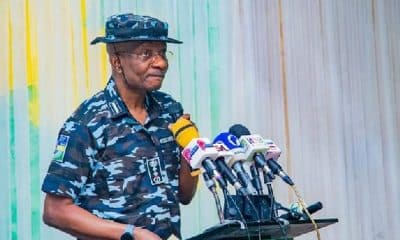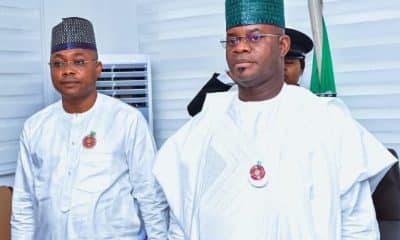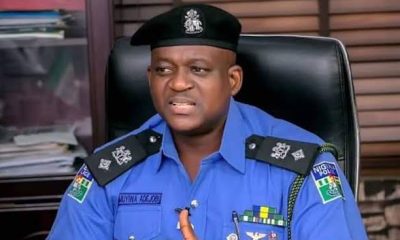Nigeria News
IBB’s Media Aide, Kassim Afegbua Sues Police IG, Others For N1bn


Kassim Afegbua
The media Aide to a former military president of Nigeria, Gen. Ibrahim Babangida (rtd), Mr. Kassim Afegbua, has instituted a fundamental human right suit against the Nigeria Police Force, the Inspector-General of Police, Mr. Ibrahim Idris, and two media houses, for alleged harassment and persecution over a statement he issued on behalf of his principal in which certain national issues were addressed.
He is demanding N1bn as damages for the breach of his fundamental human rights.
Afegbua, in the suit marked, FHC/ABJ/CS/129/2018, according to Punch, was filed before the Federal High Court in Abuja on Tuesday.
Those joined as respondents to the suit are the Nigeria Police Force, the IGP, the Force Public Relations Officer, Mr. Moshood Jimoh, the Nigerian Television Authority and the Channels TV.
The suit was filed on his behalf by Dr. Kayode Ajulo.
Afegbua described himself as a “renowned journalist, publisher, writer, spokesperson for General Ibrahim Badamosi Babangida, GCFR, and a former commissioner in Edo State.”
Recall the Inspector-General of Police, in a statement by the force PRO, Mr. Moshood Jimoh, declared Afegbua wanted in connection with the statement he issued.
Afegbua, in response had argued that he didn’t receive any formal invitation from the police before he was declared wanted.
According to the applicant, the police, the IGP and the Force PPRO used the platforms of the NTA and Channels TV to declare him wanted, an action described as intimidation and persecution of his personality.
He therefore sought through his lawyers, a declaration that “the continued witch-hunt, harassment, intimidation, and persecution of the applicant or threats thereof by the respondents ostensibly on the basis of a letter he wrote on behalf of his principal, General lbrahim Badamosi Babangida, GCFR, when his principal has not lodged any formal complaint to the police or any other security agency, amounted to the violation of his rights.”
He also sought that “the declaration by the 1st to 3rd respondents through the media of the 4th to 5th respondents that the applicant is wanted when there has been no formal invitation extended to the applicant or any attempt has been made to arrest him and he has resisted or refused to honour such invitation do not only constitute prosecutorial misconduct, malicious process, malfeasance in public office by the 1st to 3rd respondents, but also infringe unjustifiably, illegally and unconstitutionally upon the applicant’s fundamental rights to life, dignity of human person, liberty to be presumed innocent until proven guilty, freedom of expression, association and movement.”
He claimed his said rights were “guaranteed and protected respectively by sections 33, 34, 35, 36, 39, 40 and 41 of the Constitution of the Federal Republic of Nigeria, 1999 (as amended) and Articles 2,4,5,6,7,9,1o,11,12 and 13 of the African Charter on Human and Peoples’ Rights (Ratification and Enforcement)Act, Cap. A9, Laws of the Federation of Nigeria, 2004.”
In addition, he sought “an order of perpetual injunction, restraining the respondents by themselves, their officers, servants, agents and privies from the continued witch-hunt, harassment, intimidation, and persecution of the applicant or threats thereof ostensibly on the basis of a letter he wrote on behalf of his principal, General Ibrahim Badamosi Babangida, GCFR.”
He also sought “an order directing the respondents to stay all actions and to desist forthwith from proceeding with any process whatsoever, including but not limited to any purported investigation, detention, prosecution of the applicant or otherwise, which is connected, associated with or premised upon the letter he wrote on behalf of his principal, General lbrahim Badamosi Babangida, GCFR.”
He also sought an order directing the respondents to pay him “severally and jointly the sum of ₦1,000,000,000 (N1bn) as damages for the breach of the fundamental rights of the applicant.”
He also sought “an order directing the respondents to apologise to the applicant through the media of the 4th to the 5th respondents and three national newspapers.”
But he noted that “there has been no formal complaint by the applicant’s principal to the police or any other security agency of any infraction by the applicant.












